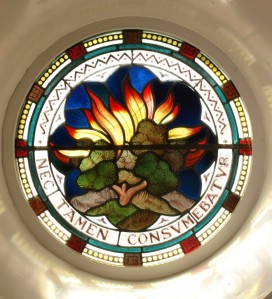Caption: “Yet it was not consumed”
Try to see events from Moses’ perspective:
You remember being raised in what for others would be luxury. That is your standard, your default. From your earliest memory, you have been stamped with the identity of being one of Pharaoh’s household.
You remember the slaves. They were other. They were outside your world. As a child, you couldn’t perceive how different they were from you, but as you grew in age, you grew more and more aware of their otherness. The fog of that otherness gradually gave way to some feeble concept of the poverty and the brutalism under which the slaves suffered.
You remember becoming a murderer. When the question “Why do they suffer while I do not?” though unvoiced, seeped down into your soul, you began, through comparison, to identify with those who were suffering. And when the weight of that disparity over days and weeks and months and years had left you with bitterness toward their oppressors, and hatred toward yourself for being one of Pharaoh’s house, you snapped at the sight of one more beating and took the life of the guilty tormenter.
You remember being running away. You remember the fear of facing your household, afraid that your refuge, your safe place, was no longer safe, your act of insurrection marking you for death. Fear for yourself caused you to lose both your identity as an Egyptian and your new-found identity as one-with-the-oppressed. You remember being a coward.
These shameful, suppressed memories are what resurface when the voice of the Most High God calls to you out of a bush in the desert, a bush that is full of light, blazing but not charring or turning to ash.
So Moses is understandably reluctant in Exodus 4 to participate in freeing the people of the covenant from Pharaoh making excuse after excuse. He is ashamed. Even though decades have passed, he is still carrying around this baggage. His self-image is as an ignorant, hypocritical, murdering coward.
But…
He said yes anyway, choosing obedience to God over acquiescence to his self-image and self-imposed limitations. And that choice led not only to a new hope for Moses, but also for all of the people of the covenant.
For more on Moses’ identity crisis see: this post
And for a better look at the first part of the Book of Exodus also dealing with new beginnings see: this much longer post




